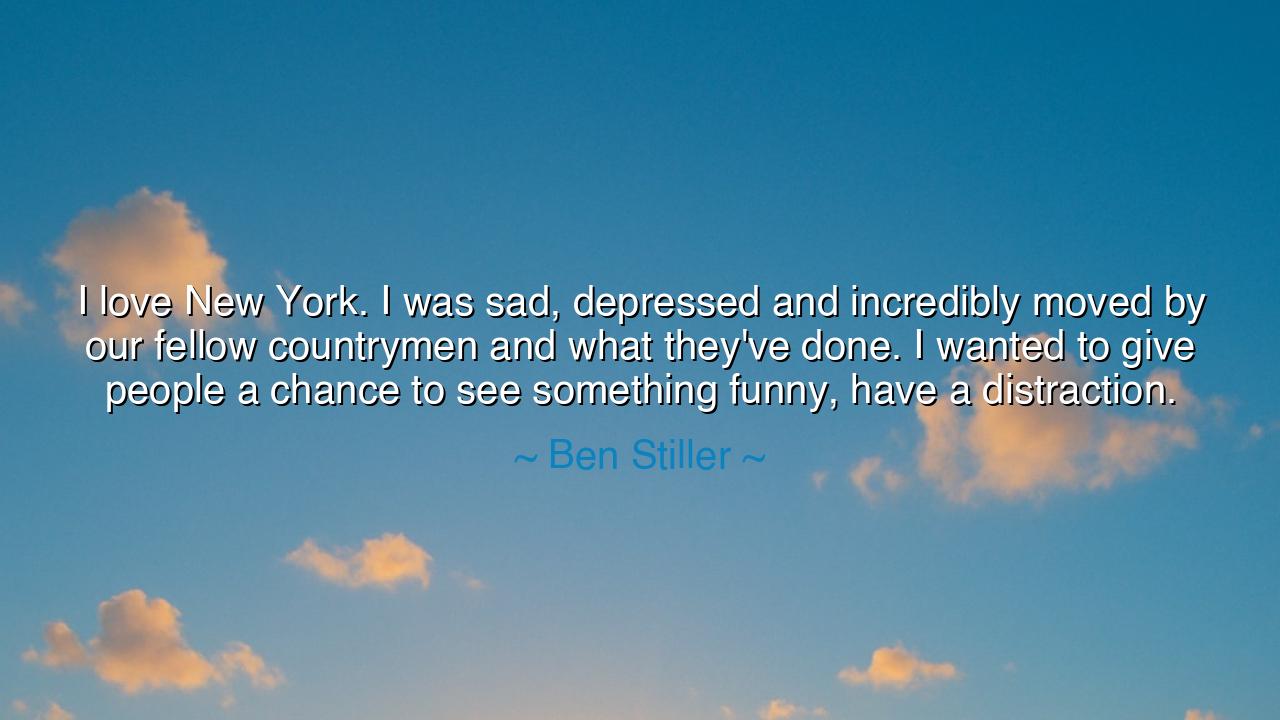
I love New York. I was sad, depressed and incredibly moved by our
I love New York. I was sad, depressed and incredibly moved by our fellow countrymen and what they've done. I wanted to give people a chance to see something funny, have a distraction.






In the words of Ben Stiller, "I love New York. I was sad, depressed and incredibly moved by our fellow countrymen and what they've done. I wanted to give people a chance to see something funny, have a distraction," we hear not just the reflection of an artist, but the voice of a person deeply touched by the suffering and resilience of his fellow human beings. His words, spoken in the wake of profound tragedy, speak to the power of art and humor as vehicles for healing. They echo a timeless truth—that in the darkest moments of our lives, we often turn to laughter and levity not to escape from reality, but to connect with the shared human experience and to lift ourselves, and others, out of the depths of despair.
Stiller’s words are not merely about the city he loves, New York, but about the profound sense of loss and grief that gripped the nation in the aftermath of the tragic events he references. In these moments, when the soul is heavy with sorrow, there is often a deep yearning for relief, for something that can momentarily ease the pain and bring light into the darkness. Stiller, recognizing the weight of this sorrow, chose to use his talent in a way that transcended entertainment. He sought to offer comfort in the form of humor—something that could provide a brief respite from the relentless heaviness of grief. Laughter, in times of crisis, becomes not just a form of distraction but a catalyst for healing, allowing individuals to reconnect with the joy that still exists in the world, even amidst tragedy.
Consider the story of Victor Frankl, a Holocaust survivor and psychiatrist, who found that humor and meaning could sustain the human spirit even in the most oppressive circumstances. In the depths of the Nazi concentration camps, Frankl observed that those who found a way to create meaning, whether through small moments of humor or acts of kindness, were often the ones who survived. Humor, in the face of suffering, becomes an act of resilience—a way to assert control over an otherwise uncontrollable situation. Just as Frankl found that the attitude we take towards suffering defines our ability to endure, Stiller’s desire to bring humor to a grieving nation speaks to this same principle: that even in the darkest times, we have the power to choose how we respond, and sometimes that response can be the spark that reignites hope.
In his statement, Stiller speaks to the shared humanity of the situation, the unspoken bond between people who have all been affected by the same pain. His recognition of the way his fellow countrymen responded with strength and resolve in the face of tragedy is deeply moving. His response, to offer a moment of lightness in a time of great sorrow, demonstrates the way that art can serve as both a reflection of and a remedy for human suffering. Humor has always had this ability—just as the ancient Greek playwrights used satire and comedy to reflect the societal struggles of their time, so too does Stiller seek to use comedy to bring people together in a time of collective grief. His words remind us that in the face of adversity, creativity and compassion often emerge as the most powerful tools for connection.
Stiller’s desire to provide a distraction is not an attempt to deny the reality of the situation, but rather an acknowledgement that in moments of suffering, the mind and spirit often need a break—a moment of respite—to regain their strength. This concept is ancient, as the Greeks believed in the cathartic power of theater, where a balance of tragedy and comedy allowed individuals to process complex emotions and emerge stronger. It is in the balance of light and dark, joy and sorrow, that the human experience finds its richness. Just as the ancient bards used their stories to reflect the harsh realities of life while still offering the promise of hope, Stiller’s offering is a modern-day reminder that even in the darkest of times, we can find moments of grace and levity.
From this, we learn a valuable lesson: in times of despair, it is not weakness to seek joy, but strength. To find the courage to laugh, to create, to connect with others, even in the face of overwhelming sorrow, is to demonstrate the resilience of the human spirit. Just as Stiller used his talents to bring a moment of brightness to a grieving world, we, too, must recognize the importance of providing comfort and lightness when it is most needed. Whether through humor, art, or simply offering a listening ear, we each have the ability to make a difference by offering others a brief respite from their burdens.
Thus, let us remember Ben Stiller's words as a call to action—to find ways to bring joy and connection to others, especially in times of suffering. Let us embrace the healing power of humor, creativity, and compassion, knowing that in moments of darkness, these are the forces that can bring us back to the light. Just as New York rose from its sorrow, so can we, through our own small acts of kindness and creativity, help lift others up when they need it most.






AAdministratorAdministrator
Welcome, honored guests. Please leave a comment, we will respond soon